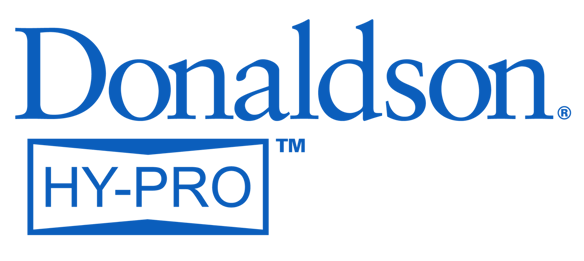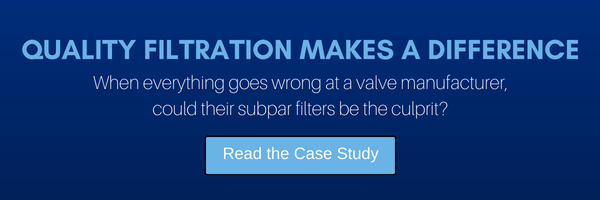The world of industrial fluid filtration can get a little...murky. Whether it's a lack of information or just simply not knowing, there are many concepts that may not be clear to someone just entering the industry. That's why we're here -- fluid filtration experts that can guide you through any issue you have. To shed some light and educate, here are some frequently asked questions and their answers.
Why should I filter my fluids?
This is the one essential question. If fluid has been fine in the past, why should you filter it? You can't see the contamination, so how much damage can it really be doing? The frank truth is, if you work with any of these oils:
- Hydraulic oil
- Lubricating oil
- Compressor oil
- Turbine oil
- Diesel fuel (synthetics or natural)
- Gear oils
...then you need to be filtering. Period.
You may be wondering why Hy-Pro is so adamant about filtration. Here's why -- in an attempt to keep costs low, Original Equipment Manufacturers (OEMs) may choose to not include adequate filtration in their machines. If you purchased a brand new piece of equipment from Brand Name Manufacturer, it would be only natural to assume that your new equipment is functioning at its highest capability. Unfortunately, these Brand Name guys have to make difficult choices to keep costs down and filtration is often the first thing on the chopping block.
It's not just using filtration that Hy-Pro preaches, it's using quality filtration.
How do I know if I need filtration?
In addition to the point made above, there are other ways to know if you need filtration. The best way to get hard evidence of contamination is to test your fluids via a bottle sample or online sample to see if you a) have problems with contamination and b) measure the levels of contamination, if present. If you are not sure how to do a bottle sample for testing, we have a video you can watch here.
If you're not ready or not yet equipped for sampling, you can watch out for other signs of fluid contamination, including:
- Servo valves failing
- A filter life shorter than its standard amount
- Higher consumption of your oil or fuel
- High heat in 90-degree bends (friction)
- Darkening lubricant color
- Burning smell
- Issues with sensitive components
Contaminants in fluids are typically not visible to the naked eye, but can be incredibly damaging to systems.
How do I know what level or type of filtration to add to my system?
We're not trying to be difficult here, but it totally depends. Let us ask you this: what components are on your system? If you have pumps or valves or cylinders, that is what will dictate the level of filtration required to keep your system working at peak performance.
For example, a servo control valve has a tighter internal clearance. Thus, you need a more efficient filtration system, because you can't really chance contamination getting stuck in there. With such a tight area, you need the best filtration you can in order to keep the particles out.
So, the components that you have will determine the level of filtration you need. The maximum level of filtration for your system is dictated by the most sensitive components. That's your base level.
What is ingression rate and why should I care about it?
Let's first start with ingression. Ingression is the term for when dirt enters from outside of your system. If you have a closed system (like the transmission in your car), then there are no openings to the outside environment. With a closed system, you'll have the least amount of ingression from the outside, as long as it's sealed.
Conversely, an open system has open ports that are not covered -- think of open spaces like the top of a reservoir. This is the worst case scenario as far as ingression is concerned because dirt, dust and water can all form contaminants in your fluid.
All that being said, compare a plastic injection molding facility that makes prescription pill bottles to a garbage truck on a rainy day. The molding facility is a controlled environment and shouldn't have much ingression in the air. The garbage truck, on the other hand, is much more susceptible to ingression.
Here's why you should care: If you have an open system, you're more at risk for ingression, which means you are more likely to need filtration to manage it.
Why is adding oil considered an ingression event?
Topping off your reservoir with new oil is an ingression event. Even if you're in a closed system, outside dirt is coming in when you add new oil. When oil is added (new or recycled), it always needs to go through a filter.
People assume that just because they're putting new oil in their system that it's not dirty, and that's just not true. New is new; new is not clean. Thus, you have to mechanically remove the dirt from the new oil by having it go through a filter; otherwise, it stays in the oil. Want to know more about how dirty your oil is? We cover it more in-depth here and here.
How do I get the dirt out of my system?
Purchasing a filter cart or kidney loop is a great way to add filtration to a system. The goal is to get your dirt concentration below your upper limit when you add your new oil. If you can do that, you're adding oil that won't put your components in peril. (Not sure of your upper limit? The OEM will provide it.) Because there are many types of contamination and many types of fluids, there are multiple solutions that could work for you.
Regardless of your system or the oil that you're using, we hold to our stance that you need proper filtration. Not sure where to start? Give us a shout! We're here to help.








